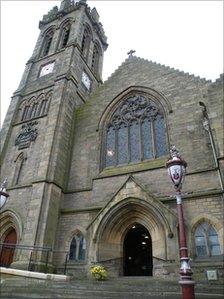Scottish election: Should church members be voters?
- Published

As a campaign is launched to encourage members of Scotland's churches to vote in the Holyrood elections on 5 May 2010, Christians in the Borders contemplate their political responsibilities.
The tune to the hymn "The King of love my shepherd is" echoes round the centre of Peebles, from the bell tower at the Old Parish Church.
The late 19th Century Gothic building dominates the town's High Street.
Inside, on a sunny Sunday morning, a congregation of about 150 people gathers for the service.
The minister, the Reverend Calum Macdougall, leads them in prayer for "a suffering world".
He mentions especially Libya, the Yemen, Tunisia and Syria.
Then he thanks God for "the blessings we enjoy, living within a democratic state."
And he prays for the forthcoming Holyrood elections.
Asking, specifically, "that all who offer themselves for election to the Scottish Parliament may do so from the very highest of motives - the earnest desire to serve the common good."
'Support' politicians
Afterwards, he is keen to explain that he did not mean to imply any questioning of people's motives for going into politics.
"I think most people go into politics for very good and noble reasons," he explains.
And, Mr Macdougall adds, he wants to stress that people who aren't standing for election "also have to play our part".
"We have to support the politicians," he said.
That is one strand of a new campaign, designed to encourage church members and congregations across the country to take part in the elections.
Chloe Clemmons, a spokeswoman for the Churches Vote initiative, told the BBC's Good Morning Scotland programme that the initiative has the support of nearly all of the country's Christian denominations.
They joined together, she explained, to "make sure that everyone who's in a church has some information that will tell them about the election".
And she quoted a leading South African churchman, to explain why that is so important.
"Archbishop Desmond Tutu is reported as saying, 'When people tell me the Bible has nothing to do with politics, I ask them which Bible are you talking about?'," she said.
'Common good'
But there are some Biblical verses which might suggest a more detached attitude to affairs of state.
In the New Testament letter 2 Corinthians, the apostle Paul tells church members "come out from among them and be ye separate".
And in the letter 1 Peter he commands Christians to be "aliens and strangers" in the secular world.
But Ms Clemmons says: "For many generations Christians have been at the heart of civil and political life in Scotland.
"All of the organisations involved in this project think it's important that Christians are part of the world.
"We have a message from the gospel that is about hope, optimism and the common good, rather than individualism.
"And we think that message is crucial in such difficult political times."
Members of Peebles Old Parish Church congregation told BBC Scotland what they would consider when deciding who to vote for.